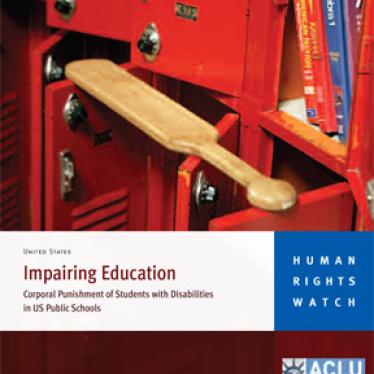Over two hundred thousand kids are punished in US schools each year by being paddled. One in five of them has a disability. No child should be paddled in school but it is hard to imagine anything more outrageous than paddling or hitting children because of their disability -- and that is what is happening: Children with autism, attention deficit disorder or Tourettes syndrome, for example, are punished for the behaviors caused by those conditions.
On April 15, Representative Carolyn McCarthy of New York, who chairs the Healthy Families and Communities Subcommittee of the Education and Labor Committee, called for an end to corporal punishment, still legal in 20 states. Passing such a law would bring the US in compliance with international legal standards that prohibit cruel, inhuman, or degrading treatment, regardless of circumstance. These standards are reflected in instruments such as the UN Convention on the Rights of the Child, the UN Convention on the Rights of Persons with Disabilities and the UN Convention Against Torture, the latter of which the US is a party to.
Who would do this to children, and why? Testimony from Rep. McCarthy's hearing suggests that corporal punishment is most frequently used in the South. Even there, it is far from universal. It is outlawed in many school districts, particularly larger and more urban districts. But it persists, with officials justifying that physical punishment is necessary to address "rising disrespect" among youth. This includes showing up late for class, violating the dress code or disrupting class.
Too often, students with disabilities are the casualty of these policies. Because of their disabilities, they will sometimes disrupt class, often unintentionally. For these students, the threat of corporal punishment creates a hostile learning environment and a culture of fear. One mother quoted in a report by Human Rights Watch and the ACLU, Impairing Education, spoke about her son with autism and how paddling affected him. "The next day, I tried to take him to school, but I couldn't even get him out of the house. He was scared of going over there, scared it would happen again...We carried him out of the house, he was screaming...Now he has these meltdowns all the time. He can't focus, he cries."
Many schools are already ill-equipped to support students with disabilities such as attention deficit hyperactivity disorder (ADHD) and autism, and allowing corporal punishment only compounds the difficulties that these students already face. Evidence from the hearing suggests that the majority of research leads to the conclusion that corporal punishment is an "ineffective method of discipline and has major deleterious effects on the physical and mental health of those on whom it is inflicted."
For students who misbehave, the evidence suggests that use of a technique called "Positive Behavioral Support" is far more effective. This includes talking to students about how they are behaving, setting up incentives and supports for better behavior, and creating individualized interactions tailored to meet the specific needs of students, both those with and without disabilities. This strategy parallels what child psychology experts refer to as "authoritative-reciprocal" parenting, an approach that is neither authoritarian nor permissive, but instead relies on dialogue and is based on mutual respect.
Corporal punishment against children with disabilities is child abuse, and it should be stopped. Rep. McCarthy's initiative to put an end to this inhumane treatment of children in school is overdue and should get wide support from all who agree that hitting any child is wrong, and hitting children with disabilities simply for being disabled, is criminal. Corporal punishment is not allowed in US prisons, it should not be allowed in US schools.








